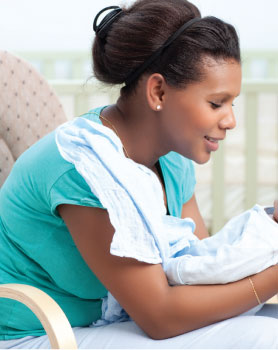For any parent, the biggest fear is that of doing something wrong when it comes to raising your children.
Whether you refuse to start feeding your baby solids because you are scared they may choke or you have become scared to drive your car with such precious cargo, parenting can be the most difficult experience of your life.
Therefore, we crave opinions and answers to all of our questions, which, as we all know, can sometimes leave you feeling worse.
Mums’ sites may not be the best places to look for help as the opinions are shared between parents with wholly different upbringings, lifestyle choices and ideas on how to raise their children. For example, where one parent may believe that sweets can be used as positive reinforcement, others may be against giving their children any form of sugar-filled treats.
One problem that often scares parents is the age at which their children achieve the set milestones. If a baby isn’t trying to walk yet and the parent knows another child of the same age who is walking already, this can make the mother and father anxious and concerned. There are many tips and opinions on how to raise your child correctly. However, ultimately every child is different. Some may start talking before they start walking, or some babies may not talk at all. Einstein refused to talk until he was four years old!
According to sources, at 10 to 13 months your child should begin to walk, and although wobbly, they should be able to stand alone with ease. A baby can start babbling overheard sequences, such as “ma” and “pa” at four to six months. From then, the child may slowly begin imitating words from their parents. By two and a half years, more than 60 per cent of their speech should by intelligible.
From when babies are born, they instantly begin growing, learning and developing in all different orders and at all different ages; this is perfectly normal. However there are some developments where, if the milestone has not been achieved at the usual age or in that time period, a doctor’s advice should be considered.
Things to remember before you visit the doctor:
• Babies who learned to crawl later than other children will often take a little bit longer to walk.
• If your baby started to move around by bottom shuffling before learning to crawl, then they may walk later.
• The speed at which a baby can learn new skills are often inherited from the parents. If you or your partner walked
early or late, then there is a chance your baby will be the same.
• Keep in mind that if your baby was born early, he or she may reach this and other milestones later than other babies.
• As long as your baby is bearing weight on his or her legs and shows an interest in learning, you don’t have to be concerned.
An expert’s advice
We had a chat with Bahrain-based psychologist Dr Anne Mostafa to further understand the importance of when a child achieves goals like speaking and walking.
Woman This Month (WTM): At what age should your baby be walking?
Dr Anne Mostafa (AM): The general age for a child to start walking is at 12 months, although you could aim for less. Keep an eye out if your baby isn’t showing any signs of walking when he or she is more than a year old.
 WTM: If your baby is still crawling well into walking age or not showing any signs of speaking correct words, whom should you contact?
WTM: If your baby is still crawling well into walking age or not showing any signs of speaking correct words, whom should you contact?
AM: You should contact your paediatrician or anyone involved with early intervention as they can screen for growth abnormalities. If something dangerous or worrying can be seen, they may then be sent to specialists.
WTM: If a child who is more than a year old visited your office and wasn’t walking yet, what would you look for?
AM: From a psychological perspective, I would look to see if the child or the parent was showing any signs of anxiety. I would then evaluate if the child had enough opportunities to learn in terms of freedom to move around. Then I look to see if there are any underlying issues with the child that may be slowing his or her development.
WTM: Are there signs to look out for if your baby isn’t developing ‘properly’?
AM: A baby usually begins to speak at 18 months. However at this age you should be mindful if your baby’s vocabulary starts decreasing or if your child does not react to his or her name being called. This could be a problem that usually develops at this stage of a baby’s life.
One reason for this repression can be sibling rivalry. Your youngster may get jealous of a newcomer or if a sibling is getting a lot of attention. With this, your child may revert back to being bottle-fed or refuse to walk so as to spend more time with the parent. If you notice any of these problems, it is advisable to seek a doctor’s appointment as soon
as possible.
WTM: Are there any general tips and advice that you can give mums if they are starting to worry about their child’s development?
AM: Earlier intervention can make a huge difference in the long term for your baby.
Dr Anne Mostafa offers therapy at her clinic in Amwaj. Her specialties range from screenings for autism, attention deficit disorder and dyslexia to helping people deal with depression, family conflicts and loss.
Visit www.psychologistbahrain.com





































